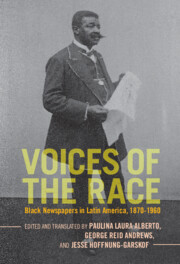Book contents
- Voices of the Race
- Afro-Latin America
- Voices of the Race
- Copyright page
- Dedication
- Contents
- Figures
- Acknowledgments
- A Note on the Text
- Introduction
- Chapter 1 Politics and Citizenship
- Chapter 2 Racism and Anti-Racism
- Chapter 3 Family, Education, and Uplift
- Chapter 4 Community Life
- Chapter 5 Women
- Chapter 6 Africa and African Culture
- Chapter 7 Diaspora and Black Internationalism
- Chapter 8 Arts and Literature
- Appendix Black Periodicals in Argentina, Brazil, Cuba, and Uruguay, 1856–1960
- Glossary
- Bibliography
- Index
Chapter 2 - Racism and Anti-Racism
Published online by Cambridge University Press: 25 August 2022
- Voices of the Race
- Afro-Latin America
- Voices of the Race
- Copyright page
- Dedication
- Contents
- Figures
- Acknowledgments
- A Note on the Text
- Introduction
- Chapter 1 Politics and Citizenship
- Chapter 2 Racism and Anti-Racism
- Chapter 3 Family, Education, and Uplift
- Chapter 4 Community Life
- Chapter 5 Women
- Chapter 6 Africa and African Culture
- Chapter 7 Diaspora and Black Internationalism
- Chapter 8 Arts and Literature
- Appendix Black Periodicals in Argentina, Brazil, Cuba, and Uruguay, 1856–1960
- Glossary
- Bibliography
- Index
Summary
Writers in Latin America’s Black press frequently publicized and denounced particularly egregious examples of discrimination or racism, including many that involved painful accusations having to do with pernicious stereotypes about Black sexuality. In so doing, they responded to claims by Latin American politicians and intellectuals that racism was mild or non-existent in their countries, and that to speak about racism was itself racist, and would have the effect of dividing the national community. The rhetorical strategies writers in the Black press adopted included barely contained expressions of outrage, skillful deployment of irony, careful efforts at debunking, and, quite frequently, with expressions of agreement with the premise that racism was inconsistent with the local political culture.Authors who wrote about racism consistently presented the United States as a yardstick against which the existence or severity of racism could be measured, or as a source for the importation and imposition of racism that was at odds with local values and tradition.Finally, writers discussed and debated the mechanisms that should be employed to combat racism.
Keywords
- Type
- Chapter
- Information
- Voices of the RaceBlack Newspapers in Latin America, 1870–1960, pp. 82 - 128Publisher: Cambridge University PressPrint publication year: 2022

